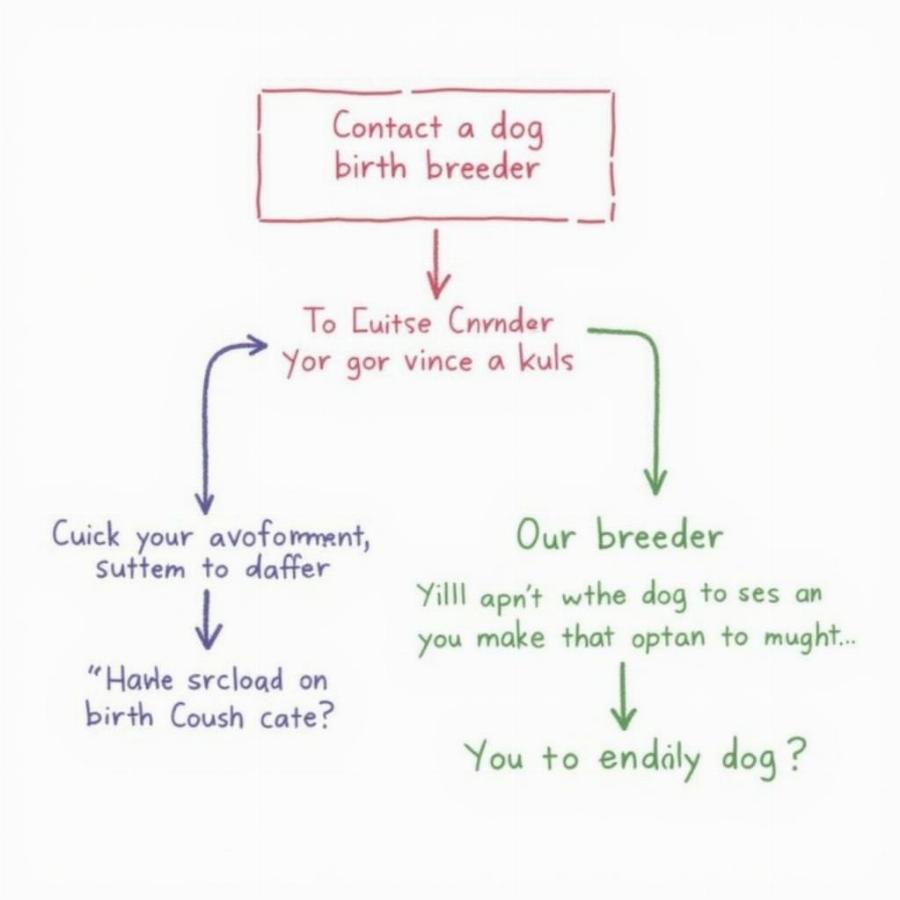A dog’s birth certificate isn’t quite the same as a human’s, but it’s an important document nonetheless. It provides key information about your furry friend’s lineage, and depending on the context, can be a valuable piece of information. Whether you’re a new puppy parent or a seasoned dog owner, understanding the nuances of a dog birth certificate can be surprisingly beneficial. Let’s dive into everything you need to know about this often-overlooked document.
What exactly does a birth certificate for a dog entail, and why is it important? This document, often provided by breeders, typically outlines the puppy’s date of birth, breed, parentage (including the sire and dam’s registered names and titles), and sometimes even the breeder’s information. While it doesn’t legally prove ownership like human birth certificates, it serves as a crucial record of your dog’s origins. This information can be invaluable for various reasons, from health tracking to breeding purposes.
What Information is on a Dog Birth Certificate?
A typical dog birth certificate from a breeder will include:
- Puppy’s Name and Registered Name (if applicable): This distinguishes your pup from their littermates and within breed registries.
- Breed: This specifies the puppy’s breed, crucial for understanding potential health predispositions and breed-specific traits.
- Date of Birth: Essential for tracking vaccinations, health milestones, and even celebrating birthdays!
- Sex: Simply indicates whether your puppy is male or female.
- Color and Markings: Helps identify your dog and can be important for show dogs.
- Sire (Father’s) Information: Includes the registered name, titles, and sometimes health information of the father.
- Dam (Mother’s) Information: Same as the sire, providing details about the mother.
- Breeder’s Information: Contact details for the breeder, which can be useful for future questions or concerns.
- Registration Information (if applicable): Details on how to register the puppy with a kennel club like the AKC or UKC.
Is a Dog Birth Certificate the Same as Registration Papers?
What’s the difference between a dog birth certificate and dog registration papers? A birth certificate is issued by the breeder and details the puppy’s immediate parentage. Registration papers, on the other hand, are issued by a kennel club like the American Kennel Club (AKC) and officially recognize the dog’s pedigree within that registry. Think of the birth certificate as the foundation, and the registration papers as the official recognition of that lineage. Registration allows participation in certain events and competitions, and further verifies the dog’s purebred status. Not all dogs with birth certificates are registered, but those with registration papers must have a recorded lineage.
Why is a Dog Birth Certificate Important?
Why should you even care about a dog birth certificate? There are several important reasons:
- Proof of Pedigree: While not as official as registration papers, it provides initial proof of lineage, particularly useful if you plan to breed your dog responsibly.
- Health Insights: Knowing your dog’s parentage can help identify potential genetic health issues prevalent in certain breeds.
- Breeding Purposes: Essential information for responsible breeding programs to maintain breed standards and health.
- Peace of Mind: Provides a documented history of your dog’s origin, offering assurance about their background.
- Potential Value: For certain breeds, a documented pedigree can increase a dog’s value.
What if I Don’t Have My Dog’s Birth Certificate?
What happens if you don’t have a birth certificate for your dog? If you adopted or rescued your dog, you might not have access to their birth certificate. Don’t worry! While it’s helpful information, it’s not essential for providing a loving home. You can still establish a strong bond and ensure their well-being. For those interested in learning more about AKC registered dogs, CKC registered dogs provide a comparable resource.
How Do I Get a Birth Certificate for My Dog?
Where can you get a birth certificate for your dog? The best source is the breeder. If you purchased your dog from a reputable breeder, they should provide you with a birth certificate. If you didn’t receive one, reach out to the breeder and inquire.
 How to Obtain a Dog's Birth Certificate
How to Obtain a Dog's Birth Certificate
Conclusion
A dog’s birth certificate, while not a legal document like its human counterpart, offers valuable information about your dog’s lineage and background. It can be essential for breeding, helpful for understanding potential health concerns, and simply provides a documented history of your furry companion’s origins. While not mandatory for pet ownership, it’s undoubtedly a valuable piece of information for any responsible dog owner. Remember, a dog birth certificate provides a glimpse into your dog’s past and can be a helpful tool in navigating their future.
FAQ
- Is a dog birth certificate legally binding? No, it’s not a legal proof of ownership, unlike a human birth certificate.
- Can I register my dog without a birth certificate? It depends on the kennel club’s regulations, but it’s generally difficult to register a dog without documented lineage.
- What if my breeder lost the birth certificate? They may be able to provide a duplicate or alternative documentation of the dog’s parentage.
- Do I need a birth certificate to microchip my dog? No, a birth certificate isn’t required for microchipping.
- Can I create a birth certificate for my dog if I don’t have one? While you can create a record of your dog’s information, it won’t be considered an official birth certificate.
- Are there gifts related to being a dog mom? Check out these amazing best dog mom gifts for inspiration.
- Looking for the perfect gift for a dog trainer? Explore our curated selection of dog trainer gifts.
Beaut Dogs is your trusted source for all things canine. We offer comprehensive information and expert guidance on dog breeds, care, and ownership. For personalized support and detailed answers to your dog-related questions, please contact us via Email at [email protected]. We’re here to help you navigate the wonderful world of dog ownership.